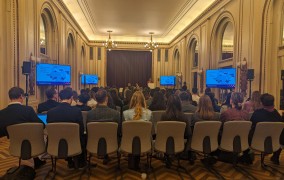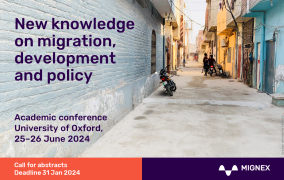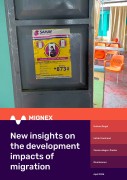News
Putting method into practice: Initial field experiences from Madina Zongo, Ghana
Fieldwork in Ghana among the densely populated, diverse communities in which migrants typically reside — popularly referred to as Zongos — provides challenges and opportunities in equal measure. Researchers at the University of Ghana share their experiences conducting field research in Madina Zongo as part of the MIGNEX survey pilot.
At first glance, Madina Zongo seems to be randomly organised, with structures dotted about with no apparent logic. But upon careful observation, there is some order the chaos. There is an eclectic mix of small-scale, informal businesses (e.g. selling charcoal, cold drinks, used clothing, street foods, bicycle spare parts etc.) serving the needs of the community. In the enumeration area some structures are comprised of up to eight different households stitched together by walls made of bricks, wood or metal sheets. Within these households, community hierarchies exist, and gender roles are respected with a reverence.
Surveying the residents of Madina Zongo
Researchers need to undertake certain steps in order to gain access to this tight-knit community. Community entry requires seeking formal permission from the traditional authorities as well as local political or community leaders prior to the commencement of fieldwork. This process involves the presentation of drinks (mostly Schnapps) and a token cash donation as a sign of courtesy and acknowledgement.
The residents of the community are genuinely friendly and welcoming, yet suspicious of the utility of yet another research project in their community. Enumerators were asked “how is your research different from the numerous others that have taken our information and given us nothing?” Researchers therefore need to be mindful of possible research fatigue in some communities, particularly if interviewees have participated in earlier researches that promised them immediate and direct benefits which did not materialise. While an anticipated and common issue with fieldwork, responding to such a pointed question requires the careful management of respondents’ expectations, obtaining of informed consent and also being truthful about the outcomes and possible impacts of one’s research (See also MIGNEX Handbook Chapter 4: Research ethics and research integrity for more details).
Testing methods in the field
The next hurdle was executing the ‘random walk’ method that was built into the sampling strategy in order to ensure a random spread of the sampled respondents. In order to help map the location of interviews, GPS location coordinates were to be captured. These turned out to be quite challenging because of cloud cover and poor signal. It took more than ten minutes of researchers chasing the signal around respondents’ households, after an interview, to capture the GPS coordinates. This was frustrating yet timely, providing a lesson we will draw on ahead of the main fieldwork in June 2020.
Respondents answered a variety of questions on their demographic characteristics, livelihoods, migration aspirations and attitudes to migration, access to social amenities, poverty and wealth, security, institutions and governance and environmental issues. Surprisingly, none of the questions elicited the same sensitivities as when respondents were asked to complete an asset list (as a proxy for wealth). Most respondents queried why they should tell a stranger what they own. These sentiments were largely informed by security concerns. This calls for methodological triangulation in order to obtain an objective assessment of variables in addition to the subjective accounts by respondents.
We look forward to discussing the pilot with the Cabo Verde and Afghanistan teams and to the main fieldwork in a few months time.





